Seychelles: independence, military rebellion and the Soviet fleet
In the XVIII century, the Seychelles began to develop the French colonialists, who created there plantations of cinnamon, cloves and vanilla. With this period in stories The islands are connected and their name is in honor of the French Minister of Finance, Moreau de Séchelles. On the uninhabited islands before the French began to import slaves from East Africa. In 1796, the British landed on the Seychelles, who occupied the islands. In 1814, in accordance with the Treaty of Paris, the Seychelles officially became British ownership. But, despite the fact that the Seychelles became a colony of Great Britain for the next one and a half centuries, the French cultural influence dominated here. Until now, the main population of the islands are descendants of French-African mulattoes, and the Creole dialect of French remains native to 92% of the population of the Seychelles. For a long time the plantation economy remained the basis of the economy of the Seychelles.
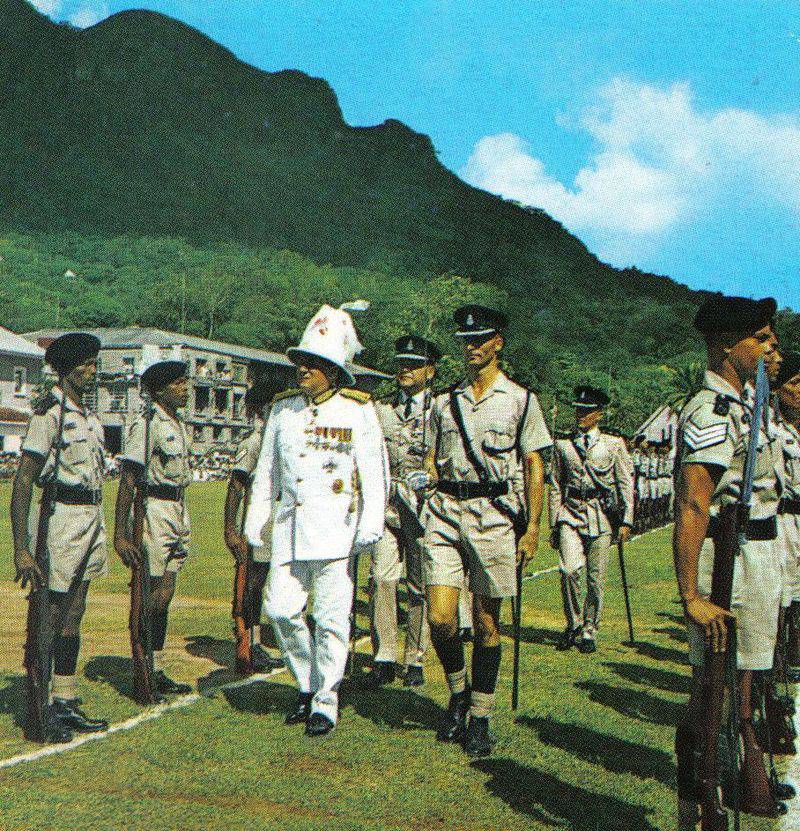
After World War II, the British leadership began to gradually come to the idea of the need to grant independence to the African colonies of Great Britain, hoping to free the metropolis from the enormous financial costs of maintaining the overseas possessions and the numerous troops stationed in the colonies. Negotiations have begun on the possible granting of independence to the Seychelles. However, on the islands, this proposal caused a mixed reaction. A young lawyer of British descent, James Manch, who led the Seychelles Democratic Party created in 1964, first advocated turning the Seychelles into autonomy within the British Empire, and when London made it clear that it was ready to provide the Seychelles only with complete independence, Manche advocated close island cooperation with metropolis. In 1970, London authorized the creation of a Seychelles parliament - the Legislative Assembly. James Manchem was appointed High Minister for Colony Affairs. In 1974, the British authorities told Manchem (pictured) that they were ready to grant political independence to the Seychelles in the near future. Not wanting the situation on the islands to destabilize, London provided Menchem and his party with serious financial assistance.
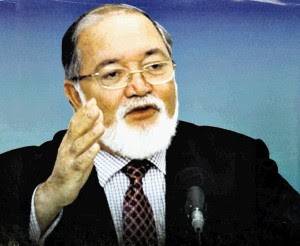 At the same time, the British authorities insisted on the appointment of France-Albert Rene, Minister of Public Works and Land Management of the Seychelles, the leader of the second most important party, the United Party of the People of the Seychelles, which had a socialist orientation. The British hoped that with the help of this appointment they would be able to prevent possible clashes on the basis of political competition between supporters of the two parties after granting independence to the Seychelles.
At the same time, the British authorities insisted on the appointment of France-Albert Rene, Minister of Public Works and Land Management of the Seychelles, the leader of the second most important party, the United Party of the People of the Seychelles, which had a socialist orientation. The British hoped that with the help of this appointment they would be able to prevent possible clashes on the basis of political competition between supporters of the two parties after granting independence to the Seychelles. The example of declaring the political independence of the Seychelles was unique in that a significant part of the political and economic elite of the islands opposed the acquisition of sovereignty to the last. In the end, in January 1976, the Seychelles and the British representatives managed to agree. Britain pledged to pay 10 million pounds sterling to the Seychelles in the first two years of independence and over the next four years of independence for 1,7 million. The main condition for receiving payment was the declaration of independence of the islands no later than six months from the time of the agreement.
29 June 1976 was proclaimed the independence of the Republic of Seychelles. On the same day, James Manch was officially proclaimed president of the country, and his main opponent, France-Albert Rene, as Prime Minister. The first republican government consisted of six representatives from the center-right Seychelles Democratic Party and five representatives from the Socialist United Party of the People of the Seychelles. However, the internal struggle in the leadership of the young republic continued. France-Albert Rene (born 1935), a forty-year-old lawyer and the son of a plantation manager, a Frenchman by birth, adhered to socialist ideas. In his youth, while studying in the UK, he participated in the activities of the Labor Party, and in 1964, returning to the Seychelles, he created the United Party of the People of the Seychelles. France-Albert Rene maintained close ties with the leadership of neighboring Tanzania, which proclaimed a policy of building Udzhamaa (communal communism) in Tanzanian communism. Ultimately, it was the Tanzanians who helped France-Albert Rene (in the photo) to take power into their own hands.
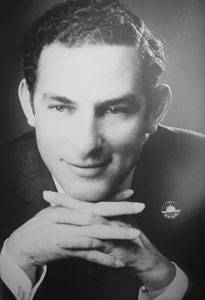 A year after the country's independence was proclaimed, in early June 1977, President James Manch was on a visit to London. 5 June 1977 A squad of several dozen armed militants of the United Party of the People of the Seychelles, trained at military bases in Tanzania, seized government offices in the capital, Victoria. The Tanzanian military also provided assistance in capturing the capital. During the coup, two people died - the policeman on duty, guarding the only warehouse in the country weapons, and Francis Rachel - one of the militants, who was later proclaimed a national hero and named in his honor the main street of Victoria. 6 June 1977 Prime Minister France-Albert Rene declared himself the president of the country. British officials who worked in the office of the former President Manchem were expelled from the country, and instead of them “Francophone” Rene invited specialists from France.
A year after the country's independence was proclaimed, in early June 1977, President James Manch was on a visit to London. 5 June 1977 A squad of several dozen armed militants of the United Party of the People of the Seychelles, trained at military bases in Tanzania, seized government offices in the capital, Victoria. The Tanzanian military also provided assistance in capturing the capital. During the coup, two people died - the policeman on duty, guarding the only warehouse in the country weapons, and Francis Rachel - one of the militants, who was later proclaimed a national hero and named in his honor the main street of Victoria. 6 June 1977 Prime Minister France-Albert Rene declared himself the president of the country. British officials who worked in the office of the former President Manchem were expelled from the country, and instead of them “Francophone” Rene invited specialists from France. James Manch, who remained in London, accused the Soviet Union of preparing a coup. In fact, the USSR had no relation to the coup in the Seychelles, but later on it really began to work closely with the Frans-Albert Rene regime. The fact is that the Soviet Union had long needed a naval base in this part of the Indian Ocean and was interested in the Seychelles. But while the fully pro-British politician James Manch was in power in the Seychelles, there was no talk of creating a Soviet naval base in the Seychelles. The situation changed after Rene, who called himself a "socialist of the Indian Ocean", came to power. In the autumn of 1977, a large landing ship “50 years of patronage of the Komsomol” of the Soviet Navy under the command of captain 3 of the rank of A. Markin arrived on Seychelles. He became the first Soviet warship to visit the republic. Thus, support was shown to the Seychelles from the Soviet Union. In 1978, the United Party of the People of the Seychelles was renamed the Seychelles Popular Progressive Front. The creation of national armed forces began, which were necessary in the conditions of preserving the threat of a new coup. Military advisers from neighboring Tanzania provided the most active assistance in creating a Seychelles army of 300 men.
France-Albert Rene began large-scale political and economic reforms. First, the nationalization of the land of the planters was begun, and the landowners themselves were expelled from the country. Secondly, large companies were nationalized, state corporations were created. The Seychellois Popular Progressive Front was proclaimed the only political party in the country. Naturally, this situation in the Seychelles did not suit the Western countries. In addition, overthrown by the first president, James Manch, who demanded to prevent the spread of Marxism in East Africa, unleashed a stormy activity in emigration. Under the leadership of Manchem in London, the Seychelles resistance movement was founded, which established close contacts with the special services of the United States and South Africa.
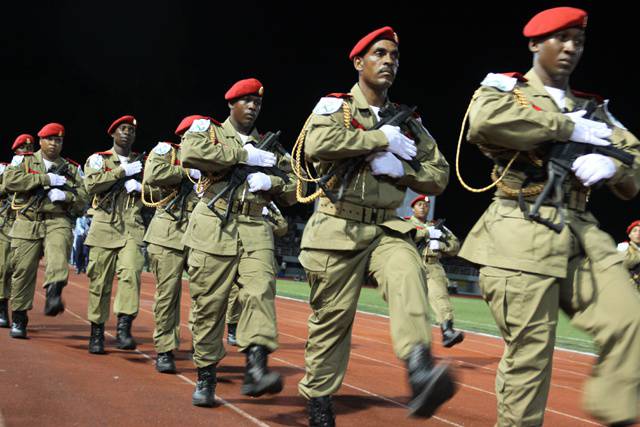
At the end of April, 1978, when the President of the Seychelles, France-Albert Rene, was on a visit to China and the DPRK, his opponents attempted a coup d'état. To this end, the conspirators turned to the help of foreign mercenaries recruited in Kenya. About two hundred militants were supposed to land on Mahe from the old torpedo boat Bonaventura, which belonged to one of James Manch's associates. But the Seychelles intelligence services became aware of the conspiracy, after which the opposition had to abandon their plans. However, in 1979, Mr. Manch again tried to organize a coup in the Seychelles - and again unsuccessfully.
Meanwhile, socialist reforms continued in the Seychelles. 23 March 1979 was adopted the first constitution of the republic, and in June 1979 presidential elections were held, in which 98% of the votes cast France-Albert Rene. In an effort to cooperate with the Soviet Union, China, the DPRK, Tanzania and other socialist countries, René was well aware that the most important source of financial income is tourism, and the majority of tourists are rich citizens of the United States and European countries. Therefore, the Seychelles president preferred not to completely spoil relations with the West. But the political circles of the United States, Great Britain and France still hoped to achieve a regime change in the Seychelles and resorted to all sorts of provocations for this. So, in the autumn of 1979, with the money of foreign businessmen, the opposition organized riots in the capital, the main participant of which was young people from affluent families. The situation escalated to the point that in November 1979, the Soviet large anti-submarine ship Marshal Voroshilov, commander-in-chief of the 3 rank V.I. Floryak, who traveled from Maputo (Mozambique) to Socotra Island (South Yemen), was ordered to go to the Seychelles. The Soviet leadership hoped that the presence of the Soviet Navy ship would be able to prevent another coup attempt.
In 1981, another coup attempt was suppressed in Seychelles - this time with the help of foreign mercenaries, commanded by 61-year-old Mike Hoar - a former major of the British army, a member of the Second World War, then became a professional mercenary and fought in the Congo, and later settled in South Africa. The plan of the coup in the Seychelles was developed by the South African military intelligence. 25 November 1981 landed a flight from Swaziland at the Seychelles Pointe-Larue Airport, carrying the 44 mercenary from South Africa who flew in the guise of rugby athletes. They brought with them 75 AK-47 automatons, 24 thousand cartridges, 40 hand grenades and 100 rockets. They were supposed to join the airborne group from the sea - another 100 mercenaries. However, at the airport, one of the drunk mercenaries found a weapon. A firefight began, mercenaries barricaded themselves at the airport, which was surrounded by Seychelles soldiers and police who were alerted. In the end, the mercenaries managed to trick the Indian "Boeing" and fly to South Africa. On November 26, the Seychelles military came to the aid of 400 Tanzanian military personnel who began to patrol the territory of the capital. On November 28 Soviet warships approached the Seychelles. At the same time, the ship of the French Navy also approached, which by this time, after the socialist Francois Mitterrand came to power, established relations with the Seychelles and also sent its military sailors to support President Rene. In 1982, 1986 and 1987 there have also been attempts to overthrow President Frans-Albert Rene, prevented by the Seychelles security agencies.
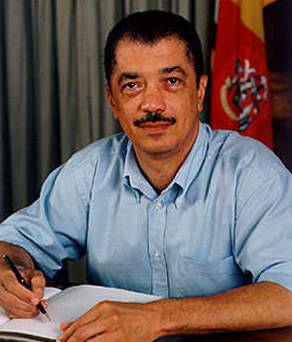
Opponents did not succeed in overthrowing the Rene regime in the Seychelles, since the president enjoyed the support of the majority of the country's population. And this is not by chance - President Rene managed to reduce the huge disparities in the income of Seychellois, to implement a program of universal employment and social insurance, to achieve universal literacy of the population. Child mortality in the Seychelles fell to the European level, and the country reached one of the highest standards of living in Africa by the standards of Africa. Even when the Soviet Union collapsed in 1991 and the Seychelles lost serious support, France-Albert Rene retained power and consistently won the elections in 1993, 1998 and 2001, which became freer and in two of which even his old Opponent James Manch. Only in 2004. 69-year-old France-Albert Rene resigned as head of state. Since then, the president of the Republic of Seychelles is a longtime associate of Rene and one of the participants in the 1977 coup, retired colonel James Michel (pictured), in 1979-1992. who served as chief of staff of the armed forces of the country.
In the 2009 year, after almost two decades of actual absence of serious ties with the Seychelles, the BOD Admiral Tributs and the tanker Boris Butoma and the rescue tug MB-99 of the Russian Navy visited the republic. In 2011, Russian warships re-visited the Seychelles. In 2015, a number of Russian media have reported that the Russian leadership is negotiating the creation of a naval base in the Seychelles. If it is really created, then Russia will acquire a serious outpost in the Indian Ocean - off the east coast of Africa, which is especially relevant in the context of the fight against Somali pirates and ensuring the safety of Russian shipping in this region.
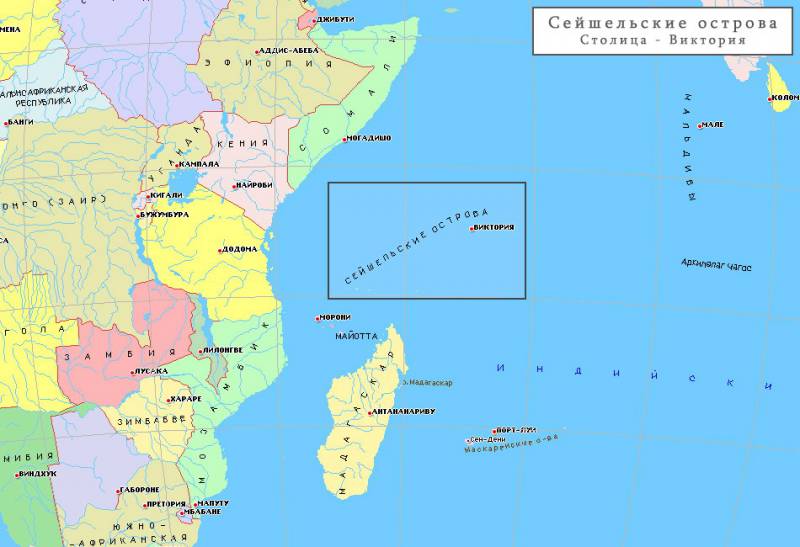
Information